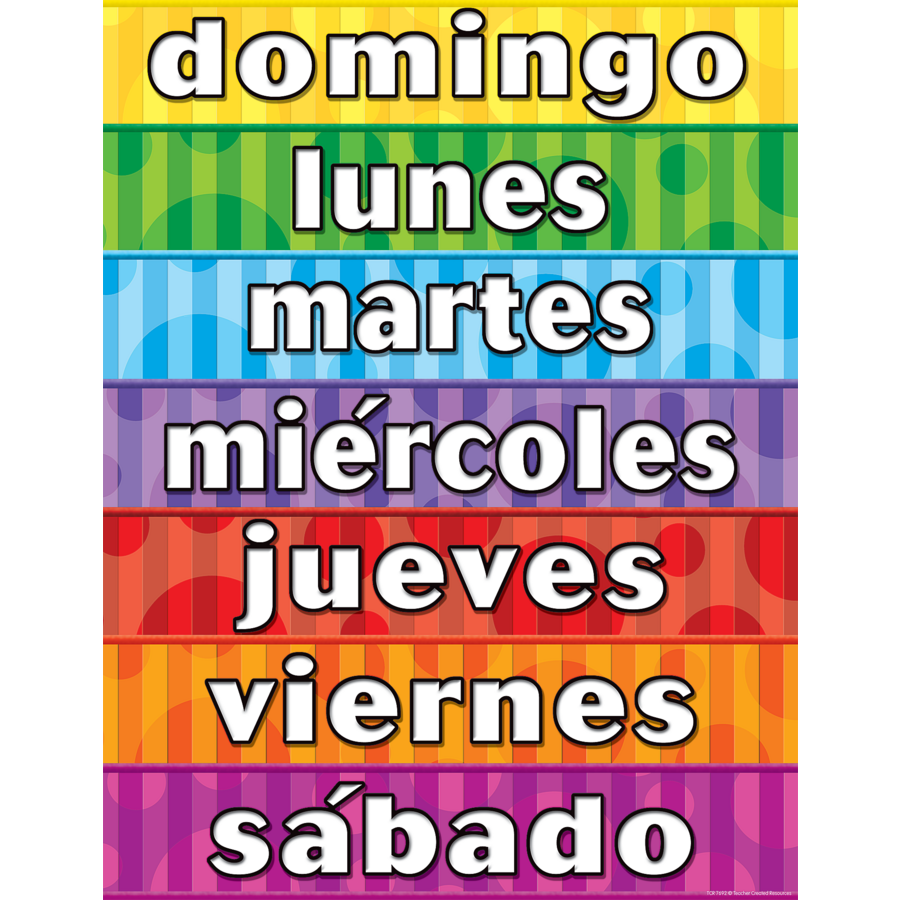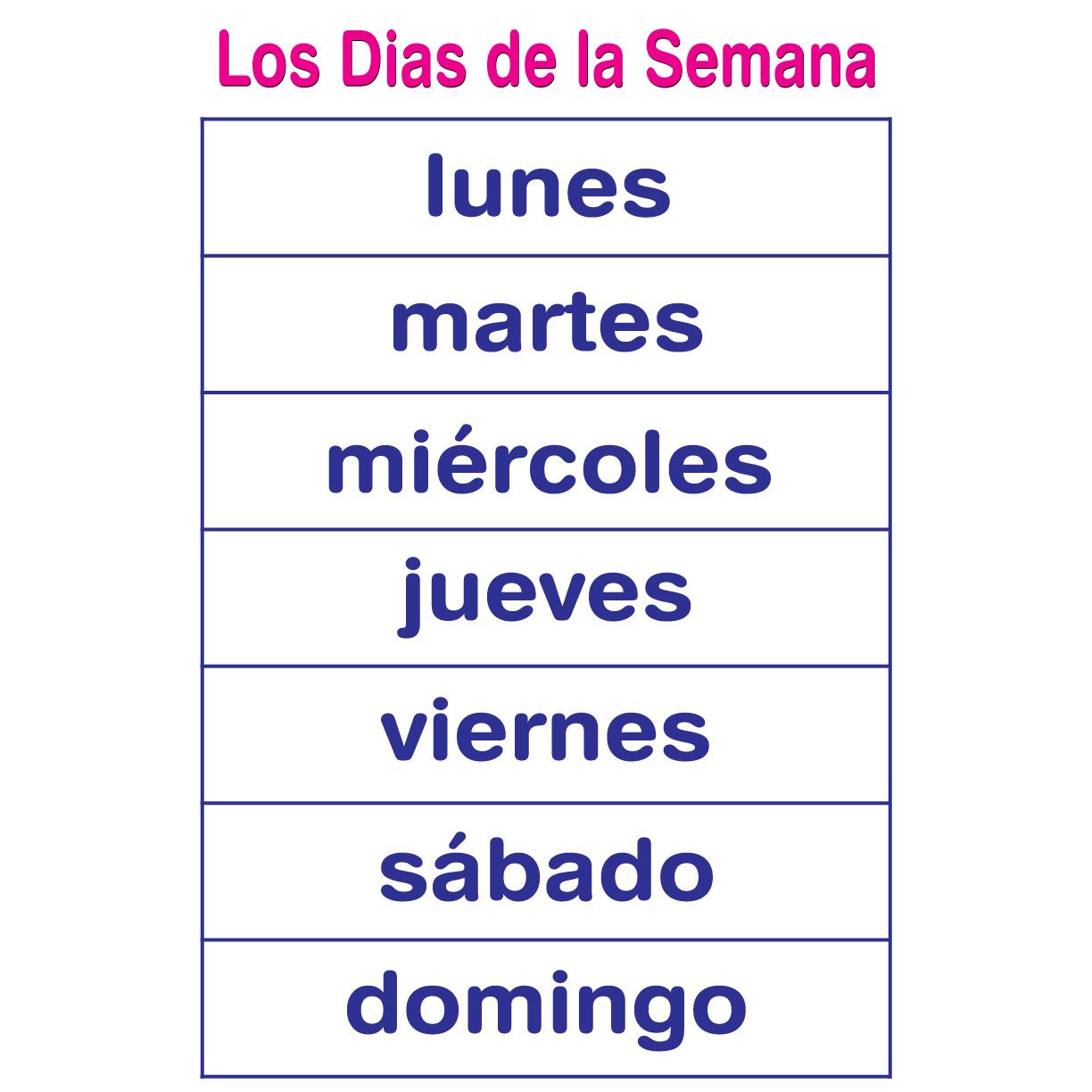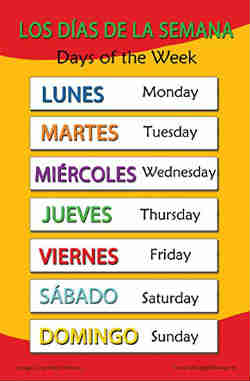The Seven Days Of The Spanish Week: A Deep Dive Into Cultura And Language
The Seven Days of the Spanish Week: A Deep Dive into Cultura and Language
Associated Articles: The Seven Days of the Spanish Week: A Deep Dive into Cultura and Language
Introduction
On this auspicious event, we’re delighted to delve into the intriguing matter associated to The Seven Days of the Spanish Week: A Deep Dive into Cultura and Language. Let’s weave attention-grabbing info and supply recent views to the readers.
Desk of Content material
The Seven Days of the Spanish Week: A Deep Dive into Cultura and Language

The Spanish language, a vibrant tapestry woven from centuries of historical past and cultural change, provides an enchanting glimpse into the Iberian Peninsula’s wealthy previous via its on a regular basis vocabulary. Nowhere is that this extra obvious than within the names of the times of the week, which, not like their English counterparts, retain a robust connection to the celestial our bodies and Roman mythology that formed the traditional world. Understanding these names reveals not solely linguistic intricacies but in addition gives a window into the historic and cultural influences that molded the Spanish language and its individuals.
In contrast to English, which largely makes use of Germanic roots for its days of the week, Spanish days are rooted in Latin, reflecting the Roman Empire’s profound affect on the Iberian Peninsula. Every day is called after a celestial physique or a Roman god related to that physique, providing a singular alternative to discover the intersection of language, mythology, and astronomy. Let’s delve into every day individually, exploring its etymology, cultural significance, and any attention-grabbing variations or colloquialisms.
Lunes (Monday): Derived from the Latin "Lunae dies," which means "day of the moon," Lunes straight displays the moon’s affect on the traditional calendar. The moon, a strong image of femininity and cyclical change, holds a major place in lots of cultures, and its affiliation with Monday within the Spanish language underscores this enduring connection. There are not any important regional variations in using "Lunes," making it a constantly understood and used time period throughout the Spanish-speaking world.
Martes (Tuesday): Named after the Roman god Mars, the god of struggle, Martes ("day of Mars") carries a robust masculine vitality. Mars, related to power, braveness, and aggression, imparts a sure gravitas to the second day of the week. Whereas the identify itself is constant throughout Spanish-speaking areas, cultural connotations related to the day would possibly fluctuate barely. Some would possibly understand it as a day for assertive motion, reflecting Mars’s warlike nature, whereas others could merely see it because the second working day of the week.
Miércoles (Wednesday): At the present time’s identify, Miércoles, originates from "Mercurii dies," which means "day of Mercury." Mercury, the swift messenger of the gods, lends an air of quickness and agility to Wednesday. In some cultures, Wednesday is related to communication, journey, and commerce, reflecting Mercury’s function as a mediator and facilitator. The identify stays remarkably constant all through the Spanish-speaking world, with minimal regional variations.
Jueves (Thursday): Jueves, derived from "Iovis dies" ("day of Jupiter"), is related to the king of the gods in Roman mythology. Jupiter, an emblem of energy, authority, and prosperity, imbues Thursday with a way of significance and management. In some cultures, Thursday may be thought-about a day for making essential choices or endeavor important duties, reflecting Jupiter’s regal standing. Once more, the time period "Jueves" stays comparatively uniform throughout all Spanish-speaking areas.
Viernes (Friday): Viernes, derived from "Veneris dies" ("day of Venus"), is called after the Roman goddess of affection, magnificence, and fertility. Venus, a strong female determine, lends a sure attraction and style to Friday. In lots of cultures, Friday is related to romance, pleasure, and leisure, reflecting Venus’s attributes. Nonetheless, in some components of the Spanish-speaking world, Friday additionally carries a barely unfavourable connotation, probably resulting from its proximity to the weekend and the anticipation (or dread) of the upcoming work week. This can be a refined cultural nuance that varies regionally.
Sábado (Saturday): In contrast to the opposite days, Sábado does not straight stem from Roman mythology. As a substitute, it is derived from the Hebrew phrase "Shabbat," which means "relaxation" or "sabbath." This displays the historic affect of Judaism on the event of the Western calendar. Sábado is universally understood and used throughout the Spanish-speaking world, highlighting the enduring affect of Jewish traditions on the worldwide calendar system. Its which means, relaxation, is universally related to the day, no matter spiritual affiliation.
Domingo (Sunday): Domingo, which means "Lord’s Day," is derived from the Latin "Dominicus dies." This explicitly Christian time period displays the profound affect of Christianity on the Western world and the institution of Sunday as a day of relaxation and worship. Domingo is universally understood and used throughout all Spanish-speaking areas, signifying the central function of Christianity in shaping the cultural panorama. The time period embodies a way of peace, reflection, and religious rejuvenation.
Regional Variations and Colloquialisms:
Whereas the essential names for the times of the week stay largely constant throughout the Spanish-speaking world, refined regional variations and colloquialisms can exist. These are sometimes minor phonetic shifts or using different, much less formal phrases, significantly in casual settings. For instance, some areas would possibly use barely completely different pronunciations or shorten the names in informal dialog. These variations, nevertheless, not often impede understanding, and the core which means stays the identical.
Cultural Significance:
The names of the times of the week in Spanish aren’t merely linguistic artifacts; they’re integral components of the cultural material. They mirror the historic influences that formed the Spanish language and its individuals, showcasing the enduring legacy of Roman mythology, Judaism, and Christianity. The celestial our bodies and deities related to every day add layers of which means and symbolism, enriching the on a regular basis expertise of time and its passage.
Conclusion:
Understanding the etymology and cultural significance of the Spanish days of the week gives a priceless perception into the wealthy historical past and cultural tapestry of the Spanish-speaking world. From the lunar affect on Lunes to the divine energy related to Jueves, every day carries a singular story, reflecting the interaction of mythology, faith, and cultural change that has formed the language and its individuals over centuries. Greater than only a easy calendar, the Spanish names for the times of the week are a testomony to the enduring energy of language to protect and transmit cultural heritage. By exploring these names, we not solely be taught a brand new language but in addition acquire a deeper appreciation for the historic and cultural forces which have formed the world we stay in at present. The seemingly easy act of naming the times of the week turns into a journey via time, revealing the fascinating connections between language, mythology, and tradition.








Closure
Thus, we hope this text has supplied priceless insights into The Seven Days of the Spanish Week: A Deep Dive into Cultura and Language. We admire your consideration to our article. See you in our subsequent article!
Leave a Reply